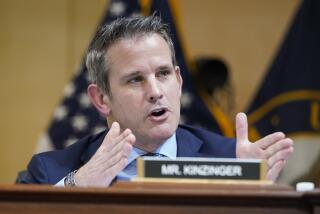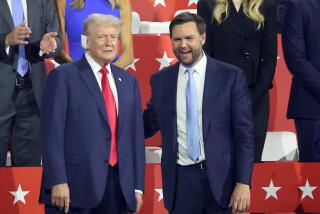War a Tough Sell for 2004 Candidates
- Share via
IOWA CITY, Iowa — Secretary of State Colin L. Powell’s presentation to the United Nations last week on Iraq may have made headlines and moved some opinions in Congress, but it didn’t do much for the crowd of Democratic activists who gathered Sunday night to hear former Vermont Gov. Howard Dean at the Prairie Lights bookstore.
As Dean spoke, Tom Slockett, the county auditor, circulated a petition urging the local city council to approve a resolution opposing war against Iraq. “So far,” Slockett said, as Dean finished his own broadside against a possible invasion, “the only people who’ve said no to signing are reporters.”
It’s not just in liberal college towns such as Iowa City, home of the University of Iowa, where the candidates for the 2004 Democratic presidential nomination are still finding enormous resistance among party activists to a possible war, even after Powell’s detailed indictment of the Iraqi regime. On Saturday, Sen. John Edwards (D-N.C.) was greeted with cries of, “No, no,” when he told a rally in Charleston, S.C., that he supported the use of military force against Iraqi President Saddam Hussein.
For most Democratic activists now shopping among the candidates, the war appears to be only one factor among many influencing their decisions on whom to support.
But the intense feelings among the most committed war opponents are creating a foothold, especially in dovish Iowa, for Dean, who’s been especially skeptical of an invasion. Those attitudes also are opening some ears for other antiwar prospects, such as the Rev. Al Sharpton, a declared candidate, or Rep. Dennis J. Kucinich (D-Ohio), who says he’s exploring the race.
At the same time, the widespread Democratic skepticism about war is creating constant tension for the three contenders who have most steadfastly supported President Bush on Iraq: Edwards, Rep. Richard A. Gephardt (D-Mo.) and Sen. Joseph I. Lieberman (D-Conn.).
Edwards, for instance, said in an interview that he has taken flak for his position “everywhere, everywhere” he has campaigned, not only among grass-roots activists but also donors and fund-raisers.
“Last weekend, I was doing an event on the West Side of New York City and it was the same thing,” he said. “They hear what you say, and they acknowledge it, but the reaction is still, even after Powell, why not give [the inspection process] more time?”
The potential war is producing a different problem for Sen. John F. Kerry (D-Mass.), who’s been the most ambivalent of the contenders. After voting for last fall’s congressional resolution authorizing Bush to use military force in Iraq, he has criticized Bush for moving too quickly toward war. Last week, though, he indicated that Powell’s “compelling case” should prompt “a final ultimatum” from the U.N. to Hussein that would be backed by military force.
Privately, aides to the other contenders supporting the war accuse Kerry of flip-flopping to woo antiwar activists in the primary while maintaining his credibility as a potential commander in chief for the general election by supporting force at the crucial moments.
Dean has been more public in his disapproval. On Sunday, he consistently drew applause when he told his audiences: “Don’t vote for the Iraq resolution and then come to Iowa and say, ‘I don’t like the war.’ ”
The most striking aspect of a weekend’s campaigning in Iowa and South Carolina is how little Powell’s U.N. appearance has changed these dynamics.
Interviews with more than two dozen Democratic activists in the two states found a consistent theme: While almost all accepted Powell’s conclusion that Hussein is developing and hiding weapons of mass destruction, almost none believe an invasion is the best way to extinguish the threat.
“I respected everything Powell laid out, but the answer is not invasion,” said Charleston attorney Charles Patrick, who helped sponsor a well-attended Edwards rally on Saturday.
A Times poll late last week found similar attitudes among Democrats nationwide. While three-fifths of Democrats said they believed Powell had demonstrated Iraq possessed weapons of mass destruction, nearly 80% still said the United States should invade only if the U.N. authorizes the attack.
And nearly half of Democrats -- compared with just one-third of the country overall -- said they believed the threat from Iraq could be contained with a program of permanent inspections, rather than military action.
Strategists for the Democratic contenders backing Bush on Iraq express optimism that such support may eventually prove an asset with primary voters and party leaders pragmatically searching for the most viable general election candidate. But among activists who provide the critical organizational infrastructure in the early states, support for the war now appears more burden than blessing.
“There is tremendous pressure on the candidates to be against the war,” said an advisor to one of these Democrats.
Edwards’ day in Charleston may have been typical. Even before his support for force drew groans at his afternoon rally, he faced skeptical questions on the issue at a morning meeting with students and professors at the College of Charleston.
Edwards never wavered in his support for military action against Iraq if Hussein does not voluntarily disarm. He told one questioner that his vote last fall for the resolution authorizing Bush to use force “was the right thing to do; I’d do it again.” And he told another dubious student that he did not believe that a permanent inspections regime could resolve the crisis. “That sort of approach has not worked,” he said to silence.
Edwards’ answers left some listeners cold. His support of Bush on Iraq “is definitely something that will affect my vote in the primary,” said Shosha Capps, a senior who challenged Edwards at the meeting.
The contrast with Dean’s experience the next day was dramatic. During an afternoon speech in Washington, Iowa, and his evening appearance at Iowa City, virtually everyone applauded when he insisted, “On Iraq, the president has not made the case for unilateral action.”
He received applause again when he criticized the four congressional Democrats in the race for supporting the authorization-of-force measure.
Dean’s own position is more nuanced than his speeches suggest. In interviews, including one with The Times on Sunday, he has said he would support U.S. military participation if Hussein continues to resist disarmament and the U.N. then votes to invade. But he insists that Iraq does not pose a sufficiently “imminent threat” to American security to justify a unilateral invasion without U.N. approval.
Even Dean said he’s unsure what effect the dispute over Iraq will have in the January caucuses and primaries if a war is completed by then. “Only voters will determine that,” he said.
More to Read
Get the L.A. Times Politics newsletter
Deeply reported insights into legislation, politics and policy from Sacramento, Washington and beyond. In your inbox twice per week.
You may occasionally receive promotional content from the Los Angeles Times.










